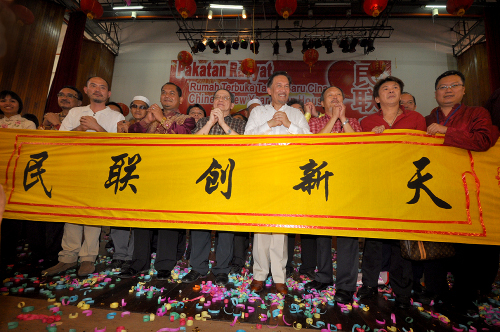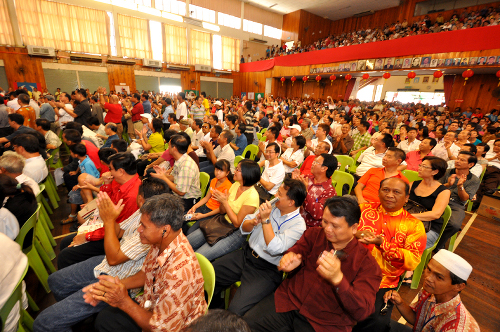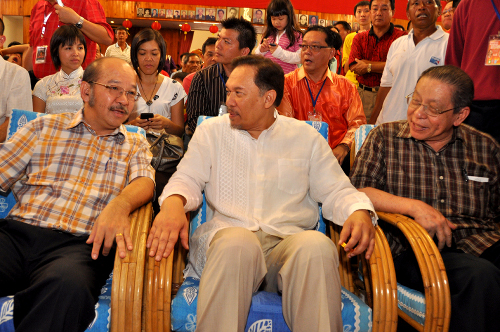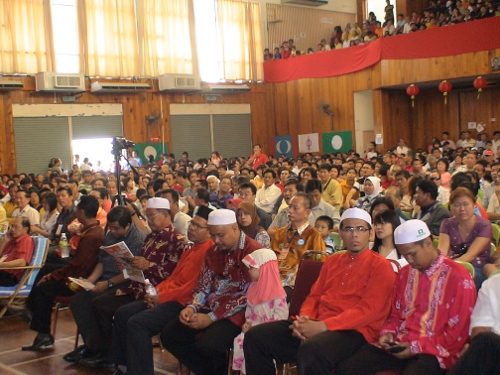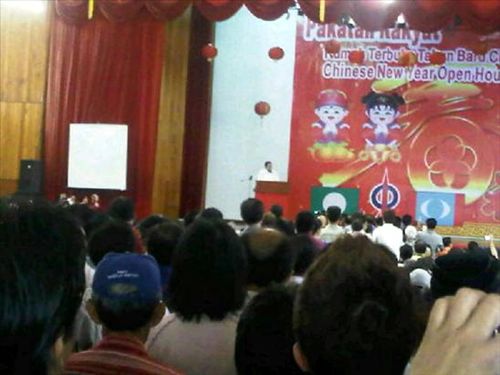By
Bakri Musa [Presented at the Third Annual Alif Ba Ta Forum, “1Malaysia Towards Vision 2020,” Rochester Institute of Technology, NY, December 5, 2009, organized by Kelab UMNO NY-NJ. The presentation can be viewed at www.youtube.com (search under “Bakri Musa RIT”) or through this link]
Part Four of Six: A Bigger Fish Story
Returning to my original tale, I now have a bigger fish story to tell; the story that is, not the fish. Consider two villages. The leader of one was suddenly struck by the fishing bug; now he also wanted his people to be great fishermen and win coveted derby prizes. He wanted to put his village on the map for its fishing prowess. So he embarked on a crash program teaching his people how to fish, importing great fishermen as teachers, and subsidizing the fishing tools. He also made fishing compulsory in schools and forced every villager to learn how to fish.
He was successful; the village’s catch increased substantially, and his villagers were winning many fishing tournaments. His leadership was widely lauded, making the other villages envious. They yearned that if only they could have such an efficient, far-sighted, single-minded, and yes, even ruthless leader, then they too would be good fishermen and their village would be equally famous.
The leader of the second village on the other hand was not at all interested in winning praises for his leadership; of course he appreciated them but he did not specifically seek them out or made that his priority. He was for developing his people, whatever their talent. If some were caught by the fishing bug, he would support them. He would not however, force everyone to take fishing classes. If others were scared of the water or could not stand the fishy smell but were interested in woodworking or something else, he would also support them and let them be. He reasoned that if they were to become good craftsmen, they could always trade their carvings for fish.
So he encouraged his followers to purse their individual dreams. He did not profess to know what those dreams were or where they would lead, but he trusted his people and encouraged them. And yes indeed, a few of his people who were not interested in fishing pursued their dreams to be scientists. He helped them by building laboratories and importing science teachers.
As luck would have it, one of those villagers who became a scientist discovered an efficient method of fish farming. Now instead of going out in the ocean and risking his life in the storm, all he had to do was scoop up the fish from his pond. He was so successful that not only could he feed his entire village, he had some for export. Sure he did not win any fishing derbies, and those fishermen would mock him for his “fishing” skills. However, where it counts – putting fish on the table – our scientist readily beat those star fishermen.
If you were a villager, which leader would you prefer? The first who would force you to accept his dream, or the second who let your pursue your own?
We will reach a developed state not by chanting and coining cute slogans but through developing our people and equipping them with modern skills, and then granting them the freedom to pursue their dreams. If fishing or rice farming is their passion, let it be, only make sure that they do not do it in the same inefficient ways of their ancestors. Instead help them become as efficient as the Japanese fishermen or American rice farmers. Japanese fishermen have refrigerated ships equipped with canning facilities, while American rice farmers sow their rice seeds from low-flying planes.
We could readily achieve this if in developing our people we would allocate the bulk of the resources towards enhancing the skills of the large middle group while simultaneously emphasizing the top 90th percentile by giving them twice the allocation on a per capita basis.
Once our people are developed, our nation would follow. Once we achieve that, then we could coin whatever fancy slogans we want.
Q & A Sessions:
Q1: What do you think of 1Malaysia, and what is your vision of a united Malaysia? I visualize it as a mighty river with many contributing streams, like the Nile. Can you comment on that?
MBM: I have never heard it put quite that way, but that is an interesting, and if I may add, original metaphor. I like it! The mighty Nile has its Blue and White Niles. I suppose Malaysia has its brown, black, yellow and a few other colors contributing to our Nile.
That metaphor presupposes that we would all mix it up and become undifferentiated, for at the Nile delta you could not separate the waters from the Blue Nile from that of the Red. Unfortunately, or fortunately I would argue, we humans are always proud of our culture, heritage, and even color. The more developed we are, the more conscious we are of our roots. Being conscious and proud of our heritage is very different from being obsessed or being defined by it. The former is positive and constructive; the latter, negative and destructive. Barack Obama personifies the former; Adolf Hitler, the second.
We all have this need to belong; we do not want to be part of a large homogenous mass. Incidentally, that is also part of Allah’s grand design; He could have made us all clones of each other. Life would not be much fun then, nor would it be beautiful.
Let me suggest a culinary metaphor instead. America prides itself with its melting pot model. There is however, no mistaking what is in the pot; it is essentially an English stew – an Anglo Saxon culture and ethos. Today that stew is enriched with the addition of Italian pasta, jalapeno peppers, and French wine, but in flavor, texture, color, and yes, even smell, it is still basically the old English stew. Even a hint of challenging that would throw things in a tizzy. Witness the frenzy of hysteria gripping the White extreme right to Obama’s presidency.
I once suggested the salad as the more appropriate metaphor for Malaysia. Yes, there are onions, black olives and other ingredients, but there is no mistaking that it is not a salad without the greens. Salads are not a regular Malaysian fare, so my metaphor fell flat. More appropriate would be the more familiar and universal favorite, rojak. The main if not defining vegetable there is taugeh (bean sprout). It alone however, does not make rojak; we need cucumbers, tofus, onions, black olives, and all the other ingredients. Without them it would not be rojak. They enhance the overall flavor. Nonetheless when you pick up a handful of rojak, you could still separate out the various ingredients, but once in your mouth, you taste only the complete rojak, not the individual vegetables.
That is my vision of a united Malaysia, the rojak. The Malays, Chinese, Ibans and others should be proud of their heritage; it is not Malaysia without them. As to what I think of 1Malaysia, I do not know as no one, least of all Prime Minister Najib, has clearly articulated what it means. Besides, I am more interested in the content, not the label. I am also not much for slogans; you should all read Shahnon Ahmad’s short story, Unggappan (slogans) about the leader consumed and intoxicated with his endless sloganeering.
Q2: Can we achieve Vision 2020? It is only a decade away.
MBM: Absolutely, nothing is impossible! However, I think your question is really this: Can we do it with the current leadership? I have not seen any evidence of bold leadership to answer in the affirmative. On major issues like the controversies on the teaching of science and mathematics and on Biro Tata Negara, Najib has remained curiously silent.
If Malaysia were to register near double-digit growth in the next ten years, that would put us in the developed category by 2020, at least by economic indices. That is not impossible, as China had demonstrated. However as mentioned earlier, high per capita income alone does not equal developed status. Brunei would quickly disabuse one of that delusion.
As for the other criteria – like respect for the rule of law and an honest police force, or at least the perception thereof – those too could be readily achievable. If Najib were to recruit from Scotland Yard or the FBI for his next police chief and head of the anti corruption agency, the impact would be immediate and dramatic.
Similarly, in making the next senior judicial appointment, if he would canvass practicing lawyers, legal scholars, heads of leading NGOs, and then heed their recommendations, that too could have a significant impact.
I pose this back to you: Is Prime Minister Najib capable of making those bold moves? Your response is the answer to the question on whether we could achieve Vision 2020.
Q 3: We all had high hopes for change following the political tsunami of the March 2008 elections. With the ongoing mess in Perak, Penang, and Selangor however, we are disheartened. It seems that these politicians, regardless of party affiliations, are the same animal. What hope is there for the nation?
MBM: If by change you mean things that you could see, yes, I share your pessimism. It seems that the same cast of lousy actors is back on stage except that this time they are wearing different costumes. They are not even good actors because they still display their old characters.
Let me suggest that you view the situation differently. The Barisan coalition, specifically UMNO, lost four states. Those are no ordinary states. Selangor, Perak, and Penang are the most developed, their economies constitute (I guess) nearly half of the nation’s. If Federal Territory with the capital Putrajaya had its own Assembly, Barisan would be thrashed there too. That is significant, symbolically. Likewise Kedah; it is rural, conservative, and very Malay. For UMNO to lose that state means that the party could not automatically count on Malay support. This is a seismic shift.
To me the most significant but not readily apparent change is with the voters. For the first time they realized that they could actually change their government simply by putting a mark on the ballot paper. There is no need to risk your limb and life by partaking in armed insurrections or demonstrating on the streets. Once citizens get that sense of empowerment, you cannot take it back. That is why in subsequent by-elections even though they would not shift the political calculus, voter turnout had seen record highs.
Other changes follow from that. Now leaders too, recognize that they could be thrown out of office. That definitely has a salutary effect. In the election of 1999, Najib Razak was nearly kicked out in Pekan. As a result he became a better politician because of that near-death political experience.
Do not give up; the March 2008 election was a political tsunami. Unlike the Asian tsunami which radically changed the physical landscape, the political tsunami of 2008 radically changed the mindset of our people. Those who ignore that would definitely be made to relearn its painful lesson come the next election.
Next: Part Five of Six: Q&A (Cont’d)
 By Neville Spykerman - The Malaysian Insider
By Neville Spykerman - The Malaysian Insider







